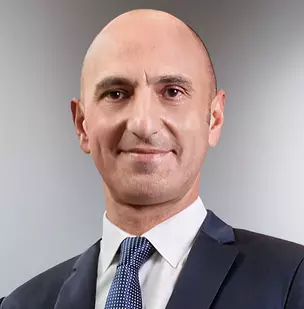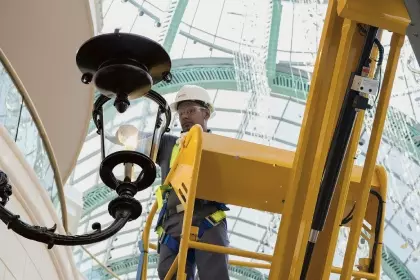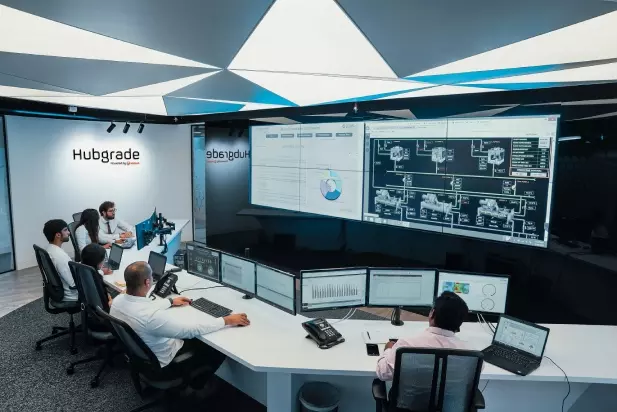Attractive and competitive, Veolia’s energy-efficiency solutions are a tremendous opportunity to establish the European Union’s energy independence.
Issue at stake
Help buildings and industrial facilities – major consumers of heat, cold, lighting and hot water – make energy efficiency an asset for their attractiveness and competitiveness
Objective
Roll out energy services that reconcile energy and environmental performance
Veolia solution
Offer smart technologies to optimize energy consumption and renewable solutions to reduce greenhouse gas emissions
Volume of Russian gas imported by the EU through pipelines in 2021
(source : AIE)
Number of measurement points centralizing energy, water and waste data in the Hubgrade control center in Dubai
Share of energy consumed in France by the building sector
(source: French Ministry of Ecological Transition)
Share of electricity used in mainland France generated from renewable energy sources in Q3 2021
(source : RTE)
Service sector buildings and industrial facilities consume a considerable amount of energy, for heating, cooling, lighting and hot water. This is where the Enova's1 energy efficiency and operational solutions come into their own, as demonstrated by the optimized energy management of Dubai’s Mall of the Emirates.
“With an exemplary energy performance contract, a high level of expertise and innovation, and proactive facility management, Enova's solutions have cut the Mall of the Emirates’ emissions by 34,000 metric tons of CO2 ,” says Azad Kibarian, Veolia Senior Executive Vice President, Italy & Africa / Middle East.
In Dubai, where temperatures approach 50 °C during the summer, “Enova's teams are demonstrating that it is possible to guarantee the energy performance of one of the world's largest shopping malls while ensuring the comfort and wellbeing of its 45 million annual visitors.”
The contract has three phases: the audit to identify the building's energy behavior; the implementation of recommended measures, and the operation and maintenance of the site using a Hubgrade2 control center. It is designed to meet the Emirates’ goal to achieve carbon neutrality by 2050.
These are considerable advantages, offering energy and economic benefits alike, that the Group has also been able to export to Europe. “On the University of Parma campus, which is home to 32,000 people, our Veolia Siram teams are piloting a sustainable and innovative energy efficiency model that guarantees annual savings of 20% in primary energy consumption. This is the typical level of savings we commit to in Italy,” he continues. “This is a big plus in the drive to help free the EU from its dependency on Russian oil and gas, and an additional argument to win over our stakeholders.”
> See also our article: What is energy sobriety?


OPPORTUNITY FROM CRISIS
These words echo those of Francisco Silvério Marques, Veolia Senior Vice President of Energy Services for Buildings: “The EU has two major challenges to meet: reduce energy consumption and promote the local production of renewable energy.” These challenges are reflected in the targets set out in Veolia's ReSource plan for 2023, namely a 5% increase in the Group's local energy production and a 5% decrease in consumption for its own needs. In addition to the subsidies available to meet these challenges, he reminds us that Veolia is making funds available “so that our countries and our teams can invest in these various projects.” In addition, since energy services for buildings are strongly linked to gas supply, the security aspect is paramount: "Despite the context, we must continue to supply our customers with heat and electricity. We need to secure sufficient flows and limit the impact of market volatility and the return of inflation.” Energy efficiency solutions provide an answer to this complex situation, and contribute significantly to the EU's goal of energy sovereignty. “At Veolia, we are actively contributing to the first objective of the REPowerEU3 plan, which aims for a 30% reduction in gas consumption by 2030, and we are aligned with the International Energy Agency's action plan.”4 Among the IEA's recommendations, he points to the one related to lowering the temperature of heating in buildings, representing a potential saving of 14 billion cubic meters of gas, or 10% of Russian gas imports by pipeline.
“ Veolia is actively contributing to the first objective of the REPowerEU3 plan.”
FRANCISCO SILVÉRIO MARQUES
Veolia Senior Vice President of Energy Services for Buildings
MANAGEMENT AND ENERGY PERFORMANCE: ECONOMIC SAVINGS
Flexcity, a Veolia subsidiary specializing in the aggregation of electrical flexibility, is proving to be a tremendous asset in this period of tension over energy resources. As it is not possible to control solar or wind production – by definition intermittent – the Flexcity solution focuses on managing electricity consumption. This intelligent electricity management system has many advantages for industrial and service sector players who wish to consume less electricity or choose the best time to use it. Hubgrade's energy management centers represent a remarkable lever for reducing energy consumption. Thanks to their exhaustive, remote and real-time vision of equipment behavior and performance, Hubgrade centers identify possible anomalies or savings opportunities, triggering de facto action on the ground.

For Francisco Silvério Marques, their importance for building management, and their excellent fit with on-site teams needs no further proof: “When a discrepancy is identified by a Hubgrade center, our on-site operators intervene immediately, for example to replace a filter, lubricate moving parts or check the tightness of a control valve. These are all elements that are not very visible, but have a strong impact on the building's energy consumption. These actions are a concrete addition to the analyses provided by the Hubgrade centers.”
What is the principle behind electrical flexibility and how does it work?
Adrien Doré: It responds to the need to balance electricity network supply and demand at any given time. With the rise of renewables in the energy mix – and their intermittency problem – electrical flexibility makes perfect sense, since we are able to intelligently control the demand for electricity without being able to influence production.
How does electrical flexibility meet the expectations or demands of industrial and service sector customers in terms of energy efficiency?
A.D.: It is the first pillar of energy efficiency. Electrical flexibility allows our partners to either consume less or to consume at the best time in order to provide the same service to their users while guaranteeing an appropriate service to the French public transmission system operator (RTE).
In the current sensitive context, how is industry preparing for the impact of energy tension?
A.D.: Today, we are witnessing a very strong paradigm shift among our customers. They are adapting their operational processes to the price of electricity. Our partners are primarily looking for new ways to offset their rising bills and to generate additional revenue to lower them.
What are the main qualities of a Flexcity Resourcer?
A.D.: At Flexcity, our employees are passionate about participating in the electricity system’s transition. In addition to the technological and digital solutions that we provide as part of our R&D, we support our partners in their thinking and in changing their production methods. The success of this type of project depends on listening, discussing and understanding our customers’ needs and expectations. That is our strength.
EcoEnergies creates an LNG cold recovery unit in the port of Barcelona
By Xavier Gil Mañero, Director of EcoEnergies, a joint venture between Veolia and Barcelona
Currently, LNG (Liquefied Natural Gas) transported by ship to the ENAGÁS terminal in Barcelona arrives at a temperature of -160°C before undergoing regasification. The LNG heated with seawater is converted from a liquid to a gas, with a significant loss of residual cold to the sea. Thanks to the project led by Veolia and its partners, this residual cold – up to 18 MW – formerly considered as ‘lost,’ will now be recovered and reused at the ENAGÁS plant as early as 2023. Equipped with specialized exchangers, it will supply liquid cold at -20°C to our cooling network. Our customers will be able to use it thanks to exchange substations and then it will return to the ENAGÁS plant to be cooled to the same negative temperature.
In the midst of the energy crisis, this project has the advantage of reducing dependence on gas imports, thanks to a local, closed-loop energy source that will benefit the main customers at the Mercabana wholesale market, as well as industrial and tertiary sector players. The 150,000 or so people spread across 1,500 hectares who use the EcoEnergies Barcelona district cooling network, will also benefit from the green-sourced cold for air conditioning. At national and European levels, this scalable project can be replicated at all LNG regasification plants. In addition to its replicability, total CO2 emission savings are estimated at 32,205 metric tons with cooling consumption expected to reach 131 GWht per year (56% of the Mercabarna food city).
1. Created in 2002, Enova is a joint venture between Veolia and Majid Al Futtaim, a pioneer in shopping malls and retail facilities in the Middle East, Africa and Asia.
2. A Hubgrade is a platform for monitoring and optimizing the energy performance of buildings.
3. REPowerEU is the European Commission's plan to make Europe independent of Russian fossil fuels.
4. IEA's 10-point plan to reduce the European Union's dependence on Russian natural gas.


